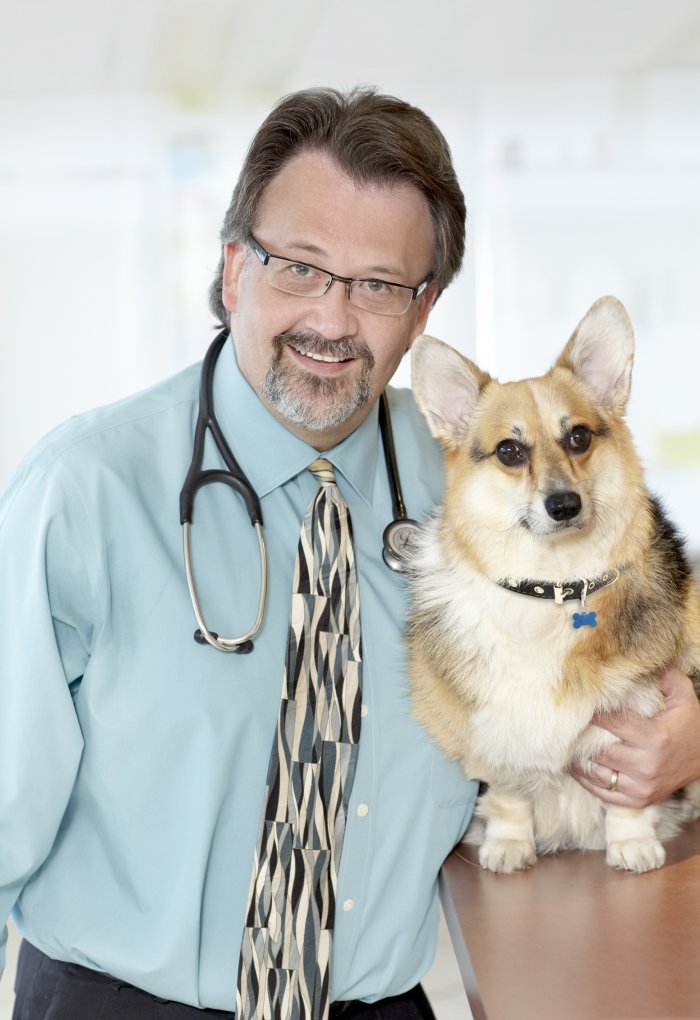This Time with a Small Swirl of Controversy
ACVIM Board-certified veterinarian addresses subject June 6, 2015 ACVIM Forum, Indianapolis
(Indianapolis, Ind.) When the U.S. Department of Agriculture gave full licensure to Merial’s Oncept, the first and only therapeutic vaccine for the treatment of cancer—in animals and humans—it received a giant amount of attention in February 2010, not only in the United States but worldwide.
The vaccine is designed for the treatment of canine oral melanoma and at the time of introduction, clinical studies demonstrated significantly longer life spans for Stage II and Stage III dogs which averaged five to six months when treated with surgery alone.

Dr. Phil Bergman, a Bedford Hills, N.Y., veterinary oncologist
Plenty has happened since then, enough, in fact, to attract a major presentation, “Controversies in Oncology: Melanoma Vaccine,” by Drs. Phil Bergman, of Bedford Hills, N.Y., and Craig Clifford, of Malvern, Pa., at the 2015 ACVIM Forum June 6 in Indianapolis.
Canine malignant melanoma, Bergman says, is the most common oral tumor in dogs and commonly occurs in poodles, Dachshunds, Scottish terriers, golden retrievers, schnauzers and Rottweilers. When diagnosed, it is usually in an aggressive state. Symptoms include halitosis, abnormal chewing, weight loss, hypersalivation, bleeding from the mouth or the visualization of a mass.
Typical treatment includes tumor aspiration, routine laboratory work, radiographs, lymph-node aspiration for cytology review and advance imaging (computed tomography).
Both canine malignant melanoma and its human counterpart are treated with aggressive local therapies, including surgery and radiation therapy.
The vast majority of veterinary oncologists use Oncept today, says Bergman, despite controversy generated by a minority of practitioners, stemming from results of small retrospective studies with 15 dogs or fewer conducted in recent years. That research, adds Bergman, stems from anecdote, personal opinion and the retrospective studies.
Asked to explain the difference between a retrospective study and prospectively designed trial, Bergman replies, “Retrospective means the investigator looked back in time on patients to see how they did. They are often very poorly controlled studies, whereas designed research has a list of criteria of which the patients must adhere to.”
Retrospective studies have sometimes been criticized for clinician bias, assuming the practitioner would have recommended the vaccine for a patient who he/she suspected had high probability of melanoma progression.
An original five-site USDA-regulated 110-dog study remains the largest work on the subject, says Bergman, an original developer of the vaccine while at New York’s Animal Medical Center, along with Dr. Jedd Wolchok at Memorial Sloan-Kettering Cancer Center, who was testing a human melanoma vaccine.
The vaccine is also being used by veterinary oncologists in Canada, the European Union and Japan. Oncept is administered via a needleless transdermal device into the inner thigh muscle with four treatments on an every-other-week basis and booster vaccines every six months. The cost of Oncept is determined by each specialist.
The USDA licensure trial closely mirrors Bergman’s clinical experience with the vaccine, i.e. it appears very safe and results in long-term survivals in 70 to 80 percent of dogs with locally controlled Stage II and III oral malignant melanoma when it is received as instructed.
“There is a 20-30 percent subset of dogs which can have progression of the disease before the vaccine has kicked in enough,” Bergman explains. “I equate this to clients as a foot race between an expanding pool of metastatic cells and an expanding pool of immune cells. With dogs which don’t have the local tumor control we only win the race 20 percent of the time. The vaccine takes months to work maximally, hence the race analogy.”
Bergman concludes, “I have the exact same confidence in the vaccine that I have had since it was fully approved. As a clinician scientist, when I first started using the product, I was as skeptical as anyone, as it seemed beyond strange that I could pull out of a refrigerator a clear liquid and inject it into patients with essentially very few side effects and have significant prolongations in survival.”
Media Attendance: Accredited members of the media may attend the 2015 ACVIM Forum at no charge. However, you are required to register with ACVIM. For media registration, please contact Laurie Nelson at Laurie@ACVIM.org or 303.231.9933 Ext. 101.
# # #
About the American College of Veterinary Internal Medicine (ACVIM)
The American College of Veterinary Internal Medicine (ACVIM) is a nonprofit organization dedicated to improving the lives of animals and people through education, training and certification of specialists in veterinary internal medicine, discovery and dissemination of new medical knowledge, and increasing public awareness of advances in veterinary medical care.
ACVIM hosts the ACVIM Forum, an annual continuing education meeting where cutting-edge information, technology and research abstracts are showcased for the veterinary community. More than 3,200 veterinary specialists, veterinarians, technicians and students attend.
“Visit Indy is thrilled to welcome the American College of Veterinary Internal Medicine to Indianapolis for their 2015 ACVIM Forum,” said Chris Gahl, Vice President of Marketing and Communications at Visit Indy. “We look forward to welcoming more than 3,200 attendees who will generate more than $4.2 million in economic impact for central Indiana.”
ACVIM is the certifying organization for veterinary specialists in cardiology, large animal internal medicine, neurology, oncology and small animal internal medicine.
To find out more about ACVIM specialists and the 2015 ACVIM Forum, please visit www.ACVIM.org.


1 Comment
My Standard Poodle was 11 when diagnosed with oral melanoma. She had jaw surgery with wide margins followed by Oncept every six months, she lived two years lost diagnosis. I would give Oncept again if I needed to make that choice. I believe it extended my dog’s life.